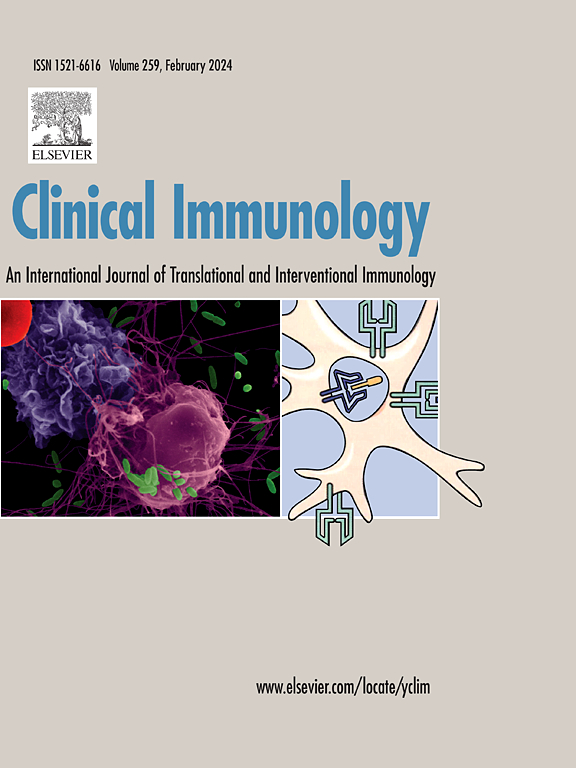体外t淋巴细胞生成分析有助于基因不明的t淋巴细胞减少症的纠正治疗选择。
IF 3.8
3区 医学
Q2 IMMUNOLOGY
引用次数: 0
摘要
持续性选择性t淋巴细胞减少症在SCID和先天性胸腺疾患中均可发现。在没有分子诊断的情况下,很难确定是否应该进行HCT或胸腺移植。体外t淋巴生成测定已被提议用于帮助基因不明患者的临床决策。我们调查了20例 t淋巴细胞减少患者,包括13例等待一线治疗的患者和7例既往HCT或胸腺移植后免疫重建失败的患者。虽然体外t淋巴生成的发育障碍表明造血细胞内在缺陷,但成功的t淋巴细胞分化需要仔细解释,并结合临床状态、免疫表型和遗传调查。在这20名患者中,13名患者继续接受治疗,6名患者中有4名在HCT后成功重建免疫系统,7名患者中有4名在胸腺移植后成功重建免疫系统,后者包括2名先前接受过HCT的患者。虽然需要进一步的验证和标准化,但我们得出的结论是,在遗传上未定义的t淋巴细胞减少症的诊断途径中评估体外t淋巴细胞生成可以通过促进纠正治疗的选择来改善患者的预后。本文章由计算机程序翻译,如有差异,请以英文原文为准。
Ex vivo T-lymphopoiesis assays assisting corrective treatment choice for genetically undefined T-lymphocytopenia
Persistent selective T-lymphocytopenia is found both in SCID and congenital athymia. Without molecular diagnosis, it is challenging to determine whether HCT or thymus transplantation ought to be performed. Ex vivo T-lymphopoiesis assays have been proposed to assist clinical decision-making for genetically undefined patients. We investigated 20 T-lymphocytopenic patients, including 13 patients awaiting first-line treatment and 7 patients with failed immune reconstitution after previous HCT or thymus transplantation. Whilst developmental blocks in ex vivo T-lymphopoiesis indicated hematopoietic cell-intrinsic defects, successful T-lymphocyte differentiation required careful interpretation, in conjunction with clinical status, immunophenotyping, and genetic investigations. Of the 20 patients, 13 proceeded to treatment, with successful immune reconstitution observed in 4 of the 6 patients post-HCT and 4 of the 7 patients after thymus transplantation, the latter including two patients who had previously undergone HCT. Whilst further validation and standardization are required, we conclude that assessing ex vivo T-lymphopoiesis during the diagnostic pathway for genetically undefined T-lymphocytopenia improves patient outcomes by facilitating corrective treatment choice.
求助全文
通过发布文献求助,成功后即可免费获取论文全文。
去求助
来源期刊

Clinical immunology
医学-免疫学
CiteScore
12.30
自引率
1.20%
发文量
212
审稿时长
34 days
期刊介绍:
Clinical Immunology publishes original research delving into the molecular and cellular foundations of immunological diseases. Additionally, the journal includes reviews covering timely subjects in basic immunology, along with case reports and letters to the editor.
 求助内容:
求助内容: 应助结果提醒方式:
应助结果提醒方式:


